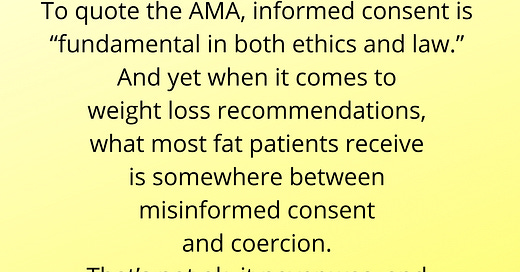This is the Weight and Healthcare newsletter! If you like what you are reading, please consider subscribing and/or sharing!
Intentional weight loss is an extremely common recommendation for healthcare providers to make to patients. While patients are given various recommendations to accomplish this, what they are rarely provided with is the opportunity to give true informed consent.
What is informed consent exactly? According to the American Medical Association Medical Ethics Opinion 2.1.1:
Informed consent to medical treatment is fundamental in both ethics and law. Patients have the right to receive information and ask questions about recommended treatments so that they can make well-considered decisions about care. Successful communication in the patient-physician relationship fosters trust and supports shared decision making.
It goes on to explain the process for informed consent:
Assess the patient’s ability to understand relevant medical information and the implications of treatment alternatives and to make an independent, voluntary decision.
Present relevant information accurately and sensitively, in keeping with the patient’s preferences for receiving medical information. The physician should include information about:
The diagnosis (when known)
The nature and purpose of recommended interventions
The burdens, risks, and expected benefits of all options, including forgoing treatment
Document the informed consent conversation and the patient’s (or surrogate’s) decision in the medical record in some manner. When the patient/surrogate has provided specific written consent, the consent form should be included in the record.
When it comes to recommending weight loss, this can go wrong at each and all of these points, so today I’ll examine them one by one:
1. A paternalistic approach is often taken when dealing with fat* patients. There is a persistent belief in a lot of healthcare education and practice that a fat body is proof of a lack of knowledge or lack of ability to understand (even for fat patients who are also experts in the field including doctors, dietitians etc.) Sometimes HCPs operate from the idea that a fat body is proof that a patient doesn’t deserve to participate in a shared decision making process. Some medical professionals (including “ethicists”) have even argued that a fat body is a justification for the removal of the right to make independent, voluntary decisions. They have advocated for shaming, blaming, threatening, misinforming, hyperbolizing, and/or holding fat patients’ medical care for ransom unless and until they engage in a weight loss attempt (and sometimes unless and until they become thin.)
2. Research since at least the 1950’s has shown that intentional weight loss fails the vast majority of the time. Many healthcare practitioners either fail to know/believe this, or fail to present the information to patients. I don’t believe that body size is a health diagnosis, but if a medical professional is treating it like it is, then they at minimum have an obligation to be honest about the failure rate of the “treatment” they are prescribing. Imagine if a prescription drug failed 95% of the time but doctors claimed that everyone who tried hard enough was cured. That is both wildly unethical, and exactly what happens with recommendations for weight loss.
In addition to explaining the failure rate, they are also obligated to explain that failure is not benign and, in fact, is independently linked with myriad physical and mental health issues.
Finally, they are obligated to explain that research has shown that health-supporting behaviors (outside of a weight loss context) can create greater benefits with far fewer risks.
3. Too often when fat patients decline a weight loss recommendation, the HCP documents it not as an informed consent conversation, but as a patient who is “non-compliant.” I can tell you from personal experience that I have said, verbatim (I practiced) “I’m exercising informed consent to decline an intentional weight loss recommendation due to your inability to provide research that shows success of long-term, significant weight loss for more than a tiny fraction of participants.” When I checked my chart, the practitioner had written “Patient is very ob*se, in denial, and non-compliant with weight loss recommendations.” I don’t want to wear out the phrase “wildly unethical,” but here we are.
To quote the AMA again, informed consent is “fundamental in both ethics and law.” And yet when it comes to weight loss recommendations, what most fat patients receive is somewhere between misinformed consent and coercion. That’s not ok, it never was, and it needs to stop.
Did you find this post helpful? You can subscribe for free to get future posts delivered direct to your inbox, or choose a paid subscription to support the newsletter (and the work that goes into it!) and get special benefits! Click the Subscribe button below for details:
*Note on language: I use “fat” as a neutral descriptor as used by the fat activist community, I use “ob*se” and “overw*ight” to acknowledge that these are terms that were created to medicalize and pathologize fat bodies, with roots in racism and specifically anti-Blackness. Please read Sabrina Strings’ Fearing the Black Body – the Racial Origins of Fat Phobia and Da’Shaun Harrison’s Belly of the Beast: The Politics of Anti-Fatness as Anti-Blackness for more on this.




Ragen -
talk about things that NEEDED to be said! The "noncompliant" label has been stuck on far too
many of us to ignore, and this really makes me feel that I've been handed a real opposition to it,
something that's reasoned & carefully researched & thought out (unlike the people who WRITE
the "noncompliant" bull in patients' records). Jen is right: we ALL need to print this material out,
along with the HAES info, to take along to appointments with new medical people. It's self-
defense, so thanks, Ragen for arming us with REAL facts!
I LOVE this framework! I never thought of informed consent in this context, but it's obviously so important.